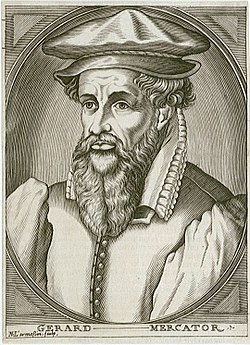Gerardus Mercator
| Gerardus Mercator | |
|---|---|
 |
|
| Born |
Geert de Kremer 5 March 1512 Rupelmonde, County of Flanders, Habsburg Netherlands (modern-day Belgium) |
| Died | 2 December 1594 (aged 82) Duisburg, United Duchies of Jülich-Cleves-Berg, Holy Roman Empire (modern-day Germany) |
| Nationality | Disputed See text below |
| Education | University of Leuven |
| Known for |
World map based on the Mercator projection (1569) One of the founders of the Netherlandish school of cartography Coining the term Atlas |
| Spouse(s) | Barbara Schellekens (m. 1534 – d. 1586) Gertrude Vierlings (m. 1589) |
| Children | (eldest), Emerentia, Dorothes, Bartholomeus, Rumold, Catharina |
Gerardus Mercator (5 March 1512 – 2 December 1594) was a 16th-century German-Netherlandish cartographer, geographer and cosmographer. He was renowned for creating the 1569 world map based on a new projection which represented sailing courses of constant bearing (rhumb lines) as straight lines—an innovation that is still employed in nautical charts.
Mercator was one of the founders of the Netherlandish school of cartography and is widely considered as the most notable representative of the school in its golden age (16th and 17th centuries). In his own day he was the world's most famous geographer but, in addition, he had interests in theology, philosophy, history, mathematics and magnetism as well as being an accomplished engraver, calligrapher and maker of globes and scientific instruments.
Unlike other great scholars of the age he travelled little and his knowledge of geography came from his library of over one thousand books and maps, from his visitors and from his vast correspondence (in six languages) with other scholars, statesmen, travellers, merchants and seamen. Mercator's early maps were in large formats suitable for wall mounting but in the second half of his life he produced over 100 new regional maps in a smaller format suitable for binding into his Atlas of 1595. This was the first appearance of the word Atlas in a geographical context but Mercator used it as a neologism for a treatise (Cosmologia) on the creation, history and description of the universe, not simply a collection of maps. He chose the word as a commemoration of a King Atlas of Mauretania whom he considered to be the first great geographer. This King Atlas was a son of the Titan Atlas but the two myths very quickly coalesced.
...
Wikipedia
